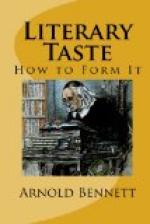My third counsel is: Buy a library. It is obvious that you cannot read unless you have books. I began by urging the constant purchase of books—any books of approved quality, without reference to their immediate bearing upon your particular case. The moment has now come to inform you plainly that a bookman is, amongst other things, a man who possesses many books. A man who does not possess many books is not a bookman. For years literary authorities have been favouring the literary public with wondrously selected lists of “the best books”—the best novels, the best histories, the best poems, the best works of philosophy—or the hundred best or the fifty best of all sorts. The fatal disadvantage of such lists is that they leave out large quantities of literature which is admittedly first-class. The bookman cannot content himself with a selected library. He wants, as a minimum, a library reasonably complete in all departments. With such a basis acquired, he can afterwards wander into those special byways of book-buying which happen to suit his special predilections. Every Englishman who is interested in any branch of his native literature, and who respects himself, ought to own a comprehensive and inclusive library of English literature, in comely and adequate editions. You may suppose that this counsel is a counsel of perfection. It is not. Mark Pattison laid down a rule that he who desired the name of book-lover must spend five per cent. of his income on books. The proposal does not seem extravagant, but even on a smaller percentage than




